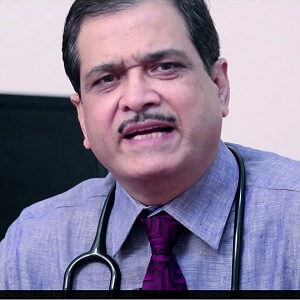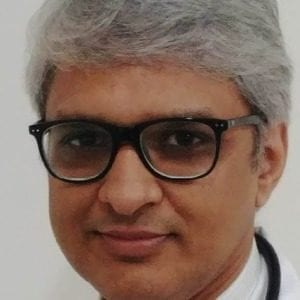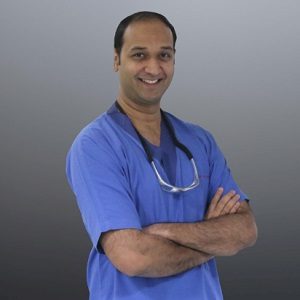Best ICD/AICD Implantation Doctors in India
- Top Interventional Cardiologist | Apollo Hospital, New Delhi, India
- 26+ Years Experience
- Indraprastha Apollo Hospital, New Delhi
Profile Highlights:
- Dr. Rajeev Kumar Rajput is one of the best Cardiologists in India with nearly 23 years of experience. He is a clinical cardiologist engaged in diagnosing and treating cardiovascular diseases.
- Dr. Rajput is currently working as a senior consultant with Indraprastha Apollo Hospitals, New Delhi, and also offers patient care at the Heart & Gynae Clinic.
- Dr. Rajeev Kumar Rajput specializes in Angiography and Interventional Cardiology. The treatments provided involve Neonatal and Infant cardiac surgeries, Device Closure, and Valve replacement. He has expertise in Aortic Aneurysm Surgery, Vascular Surgery, Percutaneous Coronary Interventions, Endovascular Repair, Cardiac Catheterisation, Open Heart Surgery, and MV replacement.
- Dr. Rajput is credited with publishing several papers in noted medical journals.
- Cardiologist, Gurugram, India
- Over 20 years’ experience
Profile Highlights:
- Dr. Vivek Chaturvedi is a highly experienced and acclaimed cardiologist with over 20 years of experience.
- He has performed more than 2500 cardiac ablations, several of them for complex arrhythmias like atrial tachycardia, ventricular tachycardia, VPC, and atrial fibrillation using the latest technology like 3D Electroanatomic mapping.
- He has more than 50 publications in international journals & books.
- Interventional Cardiologist, Chennai, India
- Over 15 years’ experience
- Apollo Hospitals Greams Road
Profile Highlights:
- Dr. Sai Satish is a distinguished Senior Interventional Cardiologist affiliated with Apollo Hospitals in India, renowned for his pioneering contributions to the field of transcatheter valve therapies.
- His expertise extends internationally, as he also serves as a practicing interventional cardiologist and esteemed faculty member at the Gottsegen Institute of Cardiology in Budapest, Hungary, one of the world’s leading centers for TAVR (transcatheter aortic valve replacement) training.
- A trailblazer in the realm of minimally invasive cardiovascular procedures, Dr. Satish is celebrated for performing the highest number of percutaneous edge-to-edge mitral repairs (MitraClip implants) in the Indian subcontinent.
Best ICD / AICD Implantation Hospitals in India
- City: New Delhi, India
Hospital Highlights:
- Over the last 33 years, the Fortis Escorts Heart Institute has set new standards in cardiac treatment with groundbreaking research. It is now known around the world as a centre of expertise for Cardiac Bypass Surgery, Interventional Cardiology, Non-invasive Cardiology, Paediatric Cardiology, and Paediatric Cardiac Surgery.
- The hospital has cutting-edge laboratories that perform a wide range of diagnostic tests in Nuclear Medicine, Radiology, Biochemistry, Haematology, Transfusion Medicine, and Microbiology.
- Fortis Escorts Heart Institute boasts a diverse group of bright and experienced doctors who are backed up by a team of highly qualified, experienced, and devoted support professionals as well as cutting-edge equipment such as the recently installed Dual CT Scan.
- Approximately 200 cardiac doctors and 1600 personnel currently collaborate to manage over 14,500 admissions and 7,200 emergency situations each year. The hospital now has a 310-bed infrastructure, as well as five cath labs and a slew of other world-class amenities.
- City: Faridabad
Hospital Highlights:
In the sprawling city of Faridabad, where healthcare needs are diverse and ever-evolving, one institution has consistently stood out as a beacon of excellence in the field of medicine—Marengo Asia Hospital. Established with a vision to provide world-class healthcare services to the community it serves, Marengo Asia Hospital has emerged as a trusted name synonymous with quality, compassion, and innovation in healthcare.
- City: New Delhi, India
Hospital Highlights:
- Equipped with 650 beds, BLK-Max Super Speciality Hospital is the largest stand-alone private sector hospital in Delhi.
- With over 1500 healthcare providers and 150 globally renowned super specialists, the hospital is one of Asia’s largest BMT Centres. The hospital is known for having some of the best cancer doctors in the country.
- The hospital is NABH and NABL accredited and was inaugurated by the first Prime Minister of India. Pt. Jawahar Lal Nehru.
- City: Chennai, India
Hospital Highlights:
- Located in Chennai, India, MGM Healthcare is a top multispecialty hospital that provides all medical services under one roof.
- Since its founding in 2019, MGM Healthcare has quickly become a leading national referral centre, creating several innovative flagship initiatives.
- MGM Healthcare combines next-generation medical and digital technologies to provide better patient results.
- With 12 centres of excellence, more than 400 inpatient beds, 100 intensive care unit beds, and 24/7 emergency care, MGM Healthcare leaves no chance in redefining the patient experience in Chennai.
- MGM Healthcare boasts 250+ expert doctors across 30+ departments, including Cardiology, Pulmonology, Neurology, Obstetrics & Gynaecology, and more.
- They house 12 specialized Centres of Excellence, including Neurosciences, Orthopaedics, and Multi-Organ Transplantation.
- Their team of doctors, nurses, and paramedics works together to give every patient individualized treatment.
- City: Noida, India
Hospital Highlights:
- Fortis Hospital, Noida, stands as one of the oldest and most trusted healthcare institutions in the region, setting a benchmark for comprehensive medical care.
- As the second mega hub hospital in the Fortis Healthcare Group, Fortis Hospital, Noida, upholds a legacy of trust among more than 1.2 million patients. By integrating top-tier professionals with cutting-edge technology, the hospital delivers superior treatment across various medical disciplines.
- Specializing in advanced Neurosciences, Orthopedics, Kidney and Liver Transplant Programmes, Fortis Hospital, Noida has successfully performed over 1,500 transplants, solidifying its reputation as a leader in specialized medical interventions.
AICD Implantation
Automated Implantable Cardioverter-Defibrillator (AICD) or an implantable cardioverter-defibrillator (ICD) is a device that is placed in the chest & monitors the heart rate & rhythm. In case, a fast abnormal heart rhythm is detected, the device provides energy to the heart muscle which normalize the heart rhythm.
The ICD comprises of two parts:
First part is the Lead(s) which are made up of wires and sensors that monitors the heart rhythm and delivers energy used for pacing.
The second part is the Pulse Generator which has a battery that houses energy, & a tiny computer that receives information from the leads to determine how the heart is beating.
Types of ICDs
Single-chamber ICD
A lead is attached in the right ventricle that provides energy to the ventricle to restore a normal heart rhythm.
Dual-chamber ICD.
Leads are attached in the right atrium and the right ventricle which provides energy to the right atrium and then to the right ventricle that helps the heart to pace in a normal sequence.
Biventricular ICD
Leads are attached in the right atrium, the right ventricle and the coronary sinus that lies adjacent to the left ventricle and helps the heart beat in a more efficient way. It is specifically used for patients suffering with heart failure.
Functions of ICD
- When the heart beat is too fast, a chain of small electrical impulses are delivered to the heart muscle which restores heart rate and rhythm. This is known as Antitachycardia Pacing (ATP)
- A low-energy shock is delivered which restores heart rhythm. This is known as Cardioversion.
- When the heart is beating too fast, a high-energy shock is delivered to the heart muscle which restores heart rhythm. This is known as Defibrillation.
- When the heart beat is too slow, a small electrical impulses is delivered to the heart which stimulates the heart muscle to maintain a suitable heart rate. This is known as Bradycardia pacing.
Conditions in which ICD is implanted
- Episode of sudden cardiac arrest (ventricular fibrillation).
- People who are at high risk for sudden cardiac arrest.
- Hypertrophic cardiomyopathy.
- Dilated cardiomyopathy.
- Ventricular tachycardia.
ICD Implant Procedure
The ICD may be implanted in two ways:
1. Endocardial (transvenous) Approach
The first way is the endocardial (transvenous) approach. It the most approach in which ICD is implanted. In this approach, a small incision is made under the collar bone. The lead is inserted into the heart, through a vein. The generator is placed in the upper chest, under the skin & attached to the lead(s).
2. Epicardial Approach
The second way is epicardial approach. This requires open-heart surgery. The lead is sewn onto the heart instead of placing the lead through a vein.
The morning after the implant, the patient will undergo a chest X-ray to make sure the ICD leads are in the proper position and the ICD will be programmed to ensure it is functioning properly.
Precautions after ICD Implantation
Short-term precautions
- Avoid vigorous exercises, including golf, tennis, swimming, bicycling, bowling or vacuuming
- Don’t lift anything weighing more than 5 pounds
- Avoid strenuous exercise programs
Long-term precautions
- It is safe to talk on a cellphone, but avoid placing the cellphone within 6 inches of the ICD implantation site when the phone is turned on.
- After surgery, the patient will receive a card that stating he/she have an ICD. Show this card to airport personnel because the ICD may set off airport security alarms.
- Avoid scanning with a hand-held detector to less than 30 seconds over the site of the ICD or make a request for a manual search.
- Some procedures, such as magnetic resonance imaging (MRI), magnetic resonance angiography (MRA), and radiofrequency or microwave ablation are not recommended after ICD implant.
- Stand at least 2 feet (0.6 meters) from welding equipment, high-voltage transformers or motor-generator systems.
- Keep magnets at least 6 inches (15 centimeters) from the ICD site.









